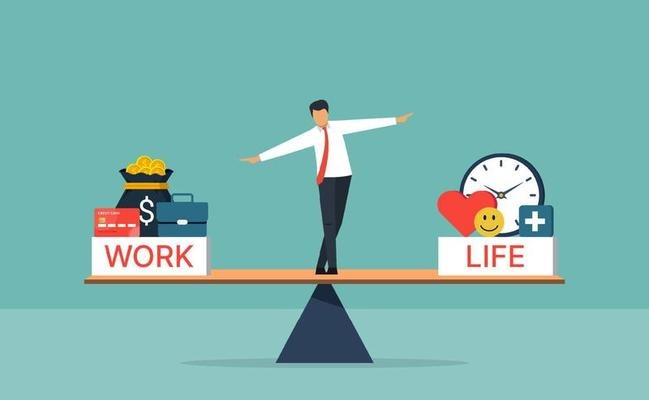Introduction: The Challenge of Balancing Work and Life
In the modern world, the pursuit of work-life balance has become a significant concern for individuals across the globe. With the rise of remote work, constant connectivity through smartphones, and increasing job demands, many people are finding it increasingly difficult to maintain a healthy balance between their professional and personal lives. The idea of work-life balance suggests that individuals should be able to effectively manage both their career and personal responsibilities without sacrificing one for the other. However, achieving this balance can often seem like an elusive goal.
In this article, we will examine the concept of work-life balance, its importance for mental and physical well-being, the challenges individuals face in maintaining balance, and strategies for achieving a healthier equilibrium in both personal and professional spheres.
What is Work-Life Balance?
Work-life balance refers to the state in which an individual is able to equally prioritize the demands of their professional career and their personal life, such as family, health, and leisure. It is often depicted as a clear separation between the time spent working and the time spent in non-work activities. However, in reality, work-life balance can be more fluid, with different individuals and industries experiencing varying degrees of balance or imbalance.
The concept of work-life balance has gained prominence as the pressures of modern work have intensified. The digital age has blurred the lines between work and personal life, with emails, messages, and tasks constantly demanding attention outside of traditional working hours. As a result, many individuals struggle to create the boundaries necessary to maintain balance.
The Impact of Poor Work-Life Balance
Failing to maintain a healthy work-life balance can have significant consequences for an individual’s physical, emotional, and mental health. Chronic work-related stress can lead to burnout, anxiety, and depression, while neglecting personal responsibilities can strain relationships and hinder personal growth.
For example, overworking can lead to physical issues such as sleep deprivation, fatigue, and increased risk of chronic conditions like heart disease and diabetes. Additionally, neglecting personal time can result in feelings of isolation and dissatisfaction, affecting one’s overall quality of life.
The Importance of Work-Life Balance
Maintaining work-life balance is crucial for long-term well-being. Achieving balance allows individuals to remain productive at work while also prioritizing their personal health and relationships. By allocating time for rest, exercise, and social connections, people are better equipped to manage stress, improve their mood, and enhance their overall happiness.
Moreover, individuals with good work-life balance tend to be more focused and efficient in their work. Taking time to disconnect from the office and recharge helps to prevent burnout and promotes creativity, allowing workers to return to their tasks with a fresh perspective and renewed energy.
Challenges to Achieving Work-Life Balance
While the benefits of work-life balance are clear, achieving it can be difficult. One major challenge is the pressure to be constantly available, particularly with the rise of remote work and digital communication tools. Many people find themselves checking emails late into the evening or taking phone calls during family time, making it hard to fully disconnect from work.
Another challenge is the increasing demands of modern careers. In industries like technology, finance, and healthcare, employees often face long hours, tight deadlines, and high expectations. In these environments, balancing work with personal responsibilities can feel like an impossible task.
Strategies for Achieving Work-Life Balance
- Set Clear Boundaries: One of the most effective ways to maintain work-life balance is by setting clear boundaries between work and personal time. This can include establishing specific working hours, turning off email notifications after work hours, and ensuring that weekends are reserved for rest and recreation.
- Prioritize Self-Care: Taking care of your physical and mental health is essential for maintaining balance. Regular exercise, healthy eating, and getting enough sleep are fundamental to staying energized and focused. Practicing mindfulness or meditation can also help to reduce stress and improve emotional well-being.
- Delegate and Share Responsibilities: Whether at work or at home, learning to delegate tasks and share responsibilities can prevent overwhelm. This can involve collaborating with colleagues to divide workloads or asking for help with household chores or childcare.
- Learn to Say No: In both professional and personal settings, it’s important to recognize your limits and be willing to say no when necessary. Overcommitting to work projects or social events can quickly lead to burnout and imbalance.
- Use Technology Wisely: Technology can be both a boon and a burden when it comes to work-life balance. Use tools like task management apps and time-blocking techniques to stay organized, but be mindful of the tendency to become too absorbed in digital tasks outside of work hours.
Conclusion: Striving for Balance in a Demanding World
Achieving work-life balance is not a one-size-fits-all solution, and it requires ongoing effort and self-awareness. While it may not always be possible to achieve perfect balance, striving for harmony between work and personal life is essential for long-term happiness, health, and success. By setting boundaries, prioritizing self-care, and staying flexible in our approach to work and life, we can create a lifestyle that allows us to thrive in both areas.



